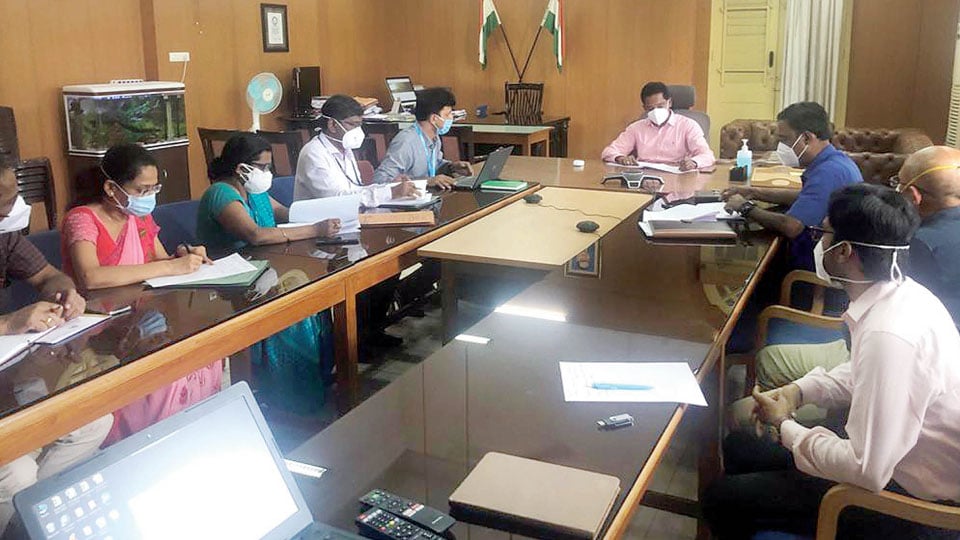By M.T. Yogesh Kumar
Mysore/Mysuru: With a gradual decline in COVID cases, Mysuru is fast recovering from the shock induced by the second wave of Coronavirus. The dip may have come as a relief but it has rung the alarm bells of a possible third wave.
Top scientists and doctors have already signalled that the third wave can be more severe than the current one and can majorly affect children.
To avert the catastrophic consequences, Mysuru District Administration has already started preparing to tackle the likelihood of a sudden surge in cases and also considering the chance of an increased risk to children.
Recently, a Paediatric COVID Management Preparedness Technical Committee met at the office of the District Health Officer (DHO) and last Friday, a high-level strategic meeting on paediatric care was held at the Mysuru DC office that was chaired by Deputy Commissioner (DC) Dr. Bagadi Gautham.
DHO Dr. K.H. Prasad was present. Such meetings will be henceforth held every week to monitor and fix the gaps.
Speaking to Star of Mysore this morning, DC Dr. Gautham said that they are working out various strategies to tackle the virus spread and the focus will be on children in the age group of zero to 19 years. The plan includes workshops and hands-on training to doctors to handle paediatric cases. The training will be provided by paediatricians and also senior doctors. Along with doctors, nursing staff and Group-D workers will also be trained on child care.
Estimated requirement of Rs. 10.26 crore
“We have prepared an estimated requirement of Rs. 10.26 crore including the funds for infrastructure like ICUs, ventilators and also oxygen beds. We will source the funds from Aarogya Raksha Samiti, State Disaster Response Funds and Corporate Social Responsibility initiatives and also from the private sector. We will also submit proposals to the Government in case of additional requirement or to fill a shortfall,” the DC explained.
District Health Officer (DHO) Dr. Prasad told Star of Mysore that the estimates for additional bed capacity for paediatric care is calculated based on the peak daily cases in the first and second waves. From this number, projections for paediatric cases and number of admissions required is derived.
For instance, in the first wave, up to Dec. 31, 2020, 52,393 persons tested positive and 4,212 in the age group of zero to 19 were infected (8 percent) of the total population of 9.50 lakh in that age category. From January 2021, 1,15,703 (till last Friday) were infected and of them 12,700 were in the zero to 19 age group (12 percent).
“Based on the guidelines issued by the Union Ministry of Health and Family Welfare, we estimate that two percent of the positive children could require hospitalisation and one in every three of them will require intensive care. So approximately 400 to 500 paediatric ICU beds are needed to be created,” he explained.
Gap analysis done
“We have zeroed in on Cheluvamba Hospital, Seth Mohandas Tulsidas Hospital, District Hospital and Trauma Care to set up ICU beds for children. Other quarantine facilities will include hostels and COVID Care Centres. Before initiating procurement of any equipment, facility wise gap analysis is a must. We have already conducted a gap analysis and a Budget requirement of Rs. 10.26 crore has been prepared and presented to the DC,” Dr. Prasad revealed.
“Children seeking care should be triaged appropriately with assessment of severity of illness. Similarly, issues of optimal treatment for MIS-C (Multisystem inflammatory syndrome in children) need to be addressed along with medications like Intravenous immunoglobulin (IVIG) where the price tag ranges from Rs. 20,000 to Rs. 2 lakh. Facilities at taluk level too are being upgraded to have adequate emergency facilities and enough HDU/ICU beds,” he added.
Training to doctors
On the doctor front, Dr. Prasad said that over 175 doctors (medical students) have come to serve in Mysuru as part of their compulsory one year rural service. All of them are being trained and during this training, doctors will be given hands-on training in operating ventilators, NW, CPAP and also the management of shock in children by eminent paediatric intensivists of the city. They will also be trained to provide CPR for newborns and children.
Other participants of the meetings were Surveillance Medical Officer of the World Health Organisation Dr. Sudheer Nayak, District Surgeon Dr. Rajeshwari, Nodal Officer for Paediatric COVID Dr. Rajendraprasad, Professor of Mysore Medical College and Research Institute (MMC&RI) Dr. Savitha, District Surveillance Officer Dr. T. Shivaprasad, Reproductive and Child Health Officer (RCHO) Dr. L. Ravi, District Early Intervention Centre (DEIC) Paediatrician Dr. Sampath Kumar, Indian Academy of Paediatrics (IAP)-Mysuru President Dr. Bhuvanesh and Secretary Dr. Shashikiran.








Recent Comments